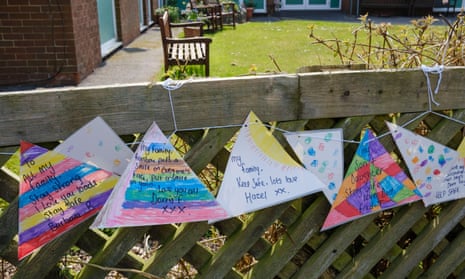Being allowed to die surrounded by your nearest relatives is a fundamental part “of any right to private or family life”, a senior judge has ruled.
Delivered in the middle of the coronavirus crisis, the court of protection ruling could have an immediate effect at a time when families have been deterred from saying goodbye to people dying in care homes and hospitals due to fears over spreading the infection.
In her judgment, in a case involving a terminally ill woman who has since died, Mrs Justice Lieven said: “The ability to die with one’s family and loved ones seems to me to be one of the most fundamental parts of any right to private or family life … It would seem to me self-evident that such a decision by the state that prevents someone with a terminal disease from living with their family, must require a particularly high degree of justification.”
The case was brought earlier this year by the daughter of the elderly woman, who had been living in a care home for almost 10 years. The woman was diagnosed with advanced terminal ovarian cancer and admitted to hospital in January. She later returned to her care home.
The court of protection deals with cases where individuals are not able to represent their own interests.
After the daughter applied to the court for her mother to be allowed to move in with her, the local authority argued that no immediate order should be made for leaving the home, and asked for further assessments.
But the judge ruled that the woman, who cannot be identified, should be able to “spend her last days with her family”. In her decision, Lieven said she had started with the “basic proposition that most people would strongly wish to die with their family around them”.
The ruling comes at a time of concern over deaths linked to Covid-19 in care homes. Many homes have banned visitors due to the risk of passing on the virus.
The judge noted that if the woman were to remain at the care home the “need to minimise the spread of the virus” and current government guidance would mean that “the most contact that she would be likely to have would be one short visit from one family member at or around the time of her death”.
It was not clear if any of the other residents at the home had Covid-19, and it was not said whether the woman had the virus, but this was a possibility, the judge said, “given some accounts of her current symptoms”.
That was important, the judge added, because the judgment was “solely” about what was in the woman’s best interests “in circumstances where she had terminal cancer and her family wanted her to die at home with them”.
In a postscript to the judgment, Lieven said that the woman died two days after she moved to live with her family. “I do not know what she died of and whether she had, indeed, contracted Covid-19,” she said.
In a statement after the judgment was published, the woman’s daughter said: “Although I am very distressed at the loss of my mother, it gives me some comfort to know that she could see the family at the end of her life. She was surrounded by our love when she died. I should not have had to fight so hard for this basic human right.”
